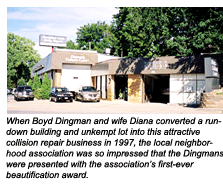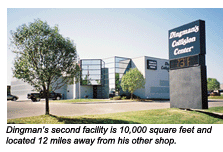Boyd Dingman knows that some people don’t think very highly of body shops.
So, despite being the busy owner of two Dingman’s Collision Centers in Omaha, Neb., Dingman makes it a priority to stay active in the collision industry and in his community.
And his involvement isn’t going unnoticed. His latest recognition: Out of the 3,200 Omaha Chamber of Commerce businesses, Dingman’s recently received the Chamber’s “Small Business of the Month” award.
“The Chamber of Commerce did a story about us and circulated that around, so we received some recognition from that,” he says. “The biggest thing is the people who don’t know of us who see we won this award. It tells our potential customers that we’re a reliable, good, honest, ethical business.
|
Dingman’s Collision Center
Square Footage: 12,000 Average Repair Cost: $1,783 |
“Being a body shop, you have to work hard at image to keep the neighbors and community from looking down on you.”
Beauty and the Body Shop
The recognition for Dingman’s and his wife, Diana’s, efforts started in 1997, the year they opened the shop.
“When we first opened here, we took a rundown building and unkempt lot, cleaned it up and remodeled it,” says Dingman. “Six months later, the neighborhood association gave us their first-ever beautification award.”

The recognition came at a good time, especially since the Dingmans needed
to establish themselves in the Omaha market.
Before coming to Nebraska, Dingman had owned a collision repair shop in Waverly, Iowa, since 1985. Business was good for years — until in the mid-90s, when the Iowa Department of Transportation decided to widen the road in front of Dingman’s shop, which meant the shop’s building would be purchased by the government and then demolished.
Business-less, the Dingmans started looking for a new city to call home.
“We were doing more than the national average said we could do out of that size community, and to rebuild for what the government gave us for the property and the building wouldn’t have been enough to get back what we had,” says Dingman. “We would have had to spend another $500,000. So we looked at our options …
“I’ve been involved with different associations, and a lot of my friends around the country were in bigger cities, working with bigger numbers — and that interested me.”
The Dingmans looked at Minneapolis, Kansas City, Des Moines and St. Louis. They decided on Omaha because “it wasn’t such a big change in population,” says Dingman.
Rather than moving to a new state and immediately starting a new business, Dingman first went to work for a paint company.
“I was shocked at how repairs were done,” he says. “I was expecting a lot higher standards because it’s a bigger city. … It gave me a different perspective. It let me see Omaha and what the market was like.”
It also motivated him. “The more I called on shops, the more I wanted to have my own,” he says.
So he and his wife checked out available locations and found one in an area that didn’t have many body shops. But the location — a rundown building and lot — needed a lot of work. The local neighborhood association was so impressed with the renovation that they created a brand new award, inspired by the Dingmans’ efforts, and bestowed it on the couple.

Raising Your Profile
Dingman has been a member of
the Jaycees and the Kiwanis, is a member of the Omaha Chamber of Commerce and the Better Business Bureau, and is active in his church. He also got some recognition a few years ago for organizing a Habitat for Humanity project, in which he led a group of local small business owners in raising funds and providing labor to help a family
in need.
“When we built the Habitat House, I raised $60,000 and we called it, ‘The House That Small Business Built,’ ” says Dingman. “We had a senator and congressman come to help. They like to get involved in community projects. We had our mayor involved, too.”
Besides his community involvement, Dingman is also consistently active in the collision repair industry. He’s currently a member of the Automotive Service Association (ASA), the Coalition for Collision Repair Excellence (CCRE) and the Nebraska Auto Body Association (NABA), and he attends the Collision Industry Conference (CIC). “What I’ve gotten out of it personally is pride,” says Dingman about being a part of so many industry associations. “I think I have things to contribute, and I have things to learn. The more people who are involved, the more we all share our thoughts and the more we’re all able to learn things. We can all work together for the betterment of our industry and the betterment of the repairs for our customers. Do what’s right and don’t let anyone convince you to do the wrong thing.”
But Dingman is also a realist. “I am somewhat disappointed in our associations today because of their lack of [effectiveness] in organizing collision repairers to work as one team.
“That’s why we see networks — because the shops don’t know who to turn to, and they’re looking for somebody to trust because so many of the associations are riding the fence. You go to a meeting, and you don’t know if it’s an insurance meeting, a supplier meeting or a body shop meeting, and I think people are getting tired of it.”
With so many in the industry “down” on associations, what advice does Dingman have for them?
“Get involved,” he says. “I say this, but at the same time I have somewhat dis-involved myself for awhile. I got kind of burned out, and I don’t see our associations as strong as they should be. I also see people making a living off of them and not really taking care of our industry. …
“DRPs could be a good thing, but the way they’re run, they’re not. [Insurers try to] shortcut repairs, some because they don’t know, don’t care or are pressured by their superiors. They all operate by intimidation. But if you join an association, you can talk to other shop owners and learn how to deal with these kinds of issues. Within every business, within every association, within every group of people, you’re going to find some that are scared to do anything. The more people involved,
the better.
“I tell people to join the association they feel is doing the most work.”
In addition to his association involvement, Dingman also takes his industry expertise to the courtroom. Recently he was asked to offer his services as an expert witness in a lawsuit against a large insurer. The insurance company was refusing to pay a claimant anything beyond the $12,000 estimate for the repair of a vehicle that was later found to have hidden damage. So Dingman wrote his own estimate — coming in at $18,000. The insurer ended up settling out of court.
“I grew up in my father’s body shop, and I believe what’s right’s right and what’s wrong’s wrong,” says Dingman. “I tell my people that the way we’re repairing cars may be old hat next year. We’re constantly changing the way we repair because of better materials and because cars change.
“I have a saying up on the wall that says, ‘If better’s possible, good is not enough.’ ”
What Goes Around…
Dingman plays a supervisory role in the company, while his son, Andy, has assumed the general manager position. Andy will direct operations for the current store and the second location. (The new shop adds 12 workers to the business’s current staff of 14.)
Although the new facility is taking up a good chunk of Dingman’s time, he still intends to stay active in the community.
“I don’t get involved in the community to benefit my business. I get involved because I feel I should give back,” says Dingman. “If you do good deeds, it comes back. What goes around comes around, and if you’re cheating everyone, it’s going to come back and
get you.”
|
Behind the Bays
|













